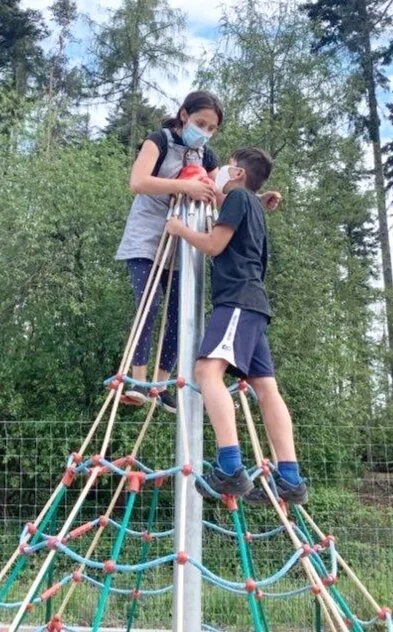Of difficult children and intense adults
/As a small child, I was variously known as “Squawk,” “Magpie” or “Anna Banana” among family and friends. These monikers all referred to my personality and vocal nature to one degree or another. I was, by all accounts—except my own— “loud,” “argumentative,” “obstinate,” “shrill,” “contradicting,” “willful” and “intense.” In short, I was what is called in today’s psychology literature a “difficult child.”
A neighbor reportedly once told my mother that if I had had a less patient mother, I would have been abused. I chuckle about it now, but I also have my own children and I’ve seen just how far “loud,” “argumentative,” “obstinate,” “shrill,” “contradicting,” “willful” and “intense” can be taken. This kind of parenting isn’t for the timid… or even for most humans.
I’m reminded of this because there’s an old meme doing another round on the internet which makes a simplified case for the pop psychology concept that children with such difficult, stubborn or argumentative personality traits will mature into adults with strong wills, solid analytical skills and independent spirits—implying that “difficult traits” in children often transform into positive adult attributes.
I don’t remember “being difficult” as a child. I remember trying to please adults, trying to navigate the world with very little vision, trying to keep up with my brothers, trying to gain inclusion into groups of other kids, trying to play games I couldn’t see, trying, trying, always striving, rarely being allowed to just be in a place where I didn’t have to fight to hold my ground. And so, for the most part, I believe the reports about my combative, willful and shrill nature as a child.
I was always in a battle to keep up and be included. No wonder I came across as if I was fighting.
Of course, I’ve known quiet, passive, sweet-natured blind children. In fact, most of the blind kids I met at “blind summer camps” were more like that. I was an outlier. Most blind kids learned that the best way to get by in the sighted world was to be sweet in order to attract good things and then to wait quietly for hours to be noticed or occasionally included when it was convenient for the sighted majority.
I remember observing how they were treated and feeling very angry inside—on their behalf, I thought, though now I wonder. Mostly I’ve known only those two types of blind children—willful, shrill terrors like me (and reportedly Hellen Keller) and the sweet, passive flowers. The world greeted me with exasperation and accusations of “being a drama queen,” and greeted the other type with occasional pity and long-term indifference.
I’m told pity is a horrible thing to endure as a blind or disabled person. I don’t have a lot of experience with it myself. I’ve always been so intense, willful and self-advocating that I think I have mostly avoided that fate. So, I’ll reserve judgement on which response is worse, having little experience with the shade of green on the other side of that particular fence. That said, being constantly seen as “irritating” and “overly demanding” just for asking for a place at the table has often been hard.
I don’t know if I had much choice about my intense personality. I grew up in a rough-and-tumble physical world in the woods and hills of Northeastern Oregon—not in a town near them, but in them. I’ve known several legally blind kids who grew up in small, rural towns but spent most of their time indoors, doing sedentary things and waiting to be taken places. That was never a choice in my childhood. I was outside in the woods even as a toddler, trailing behind other kids, tossing pebbles to hear the terrain in front of me and yelling “Wait for me!” after my brothers with irritating persistence.
And I did gain some things the more passive blind kids lacked as a result. I learned such good mobility skills that most people don’t realize I’m legally blind. I have a workaround for just about every physical task that takes vision—from threading needles to hammering nails to flipping pancakes. (Not driving, of course. There are limits.) In my twenties, I often said I was fortunate to have had the childhood I did and the personality I had.
So, is the meme right? I was most of the things the meme describes about difficult children—stubborn, defiant, clingy, argumentative... I wasn’t particularly disobedient, or not more so than other children as far as I’ve heard. But did my stubbornness, defiance, clinginess and argumentativeness serve me well and result in positive adult characteristics in the end?
Today, I’m not so sure. While I was able to gain academic success by being “willful, demanding and stubborn,” I’ve often run into situations in the professional world, where these traits are not helpful and result in being shut out of opportunities. I’ve seen some of the quiet, submissive blind people I used to think had things worse than me gain stable—if often boring—employment and a small but steady circle of friends. Their way definitely has its benefits.
Even more troubling than that is my ongoing worldview of constant struggle. It is very hard to argue that it is unwarranted. I have only rarely chosen to fight when I didn’t have to. But my experience of endless battle against a hostile world has been isolating, not to mention stressful on a deep level. I would not wish it on any young kid.
As an adult, I’m often told that I’m “too intense.” Only rarely is that ever given any specificity, but I believe it must be related to my childhood traits. While I learned to physically adapt to my visual disability to a high degree, I’ve never cracked the code of non-verbal cues, eye contact and recognizing faces that are only vague blurry ovals to me. And yet, because of my stubborn and defiant nature, I keep banging my head against that communication wall, often to the irritation of those on the other side of it.
And watching my own kids and my students mature, I have a broader outlook on the meme’s conclusions as well. While it is true that some level of argumentativeness and spunk in a kid shows a likelihood that the future adult will be able to hold their own and not be passive or wishy-washy throughout their life, the conclusions of the meme are simplistic and ignore less savory realities.
In response, I made my own list of where difficult personality traits can lead in anyone—child or adult—if not tempered. This is not to say that I or anyone else who has the “difficult trait” is doomed to a negative future. But these are pitfalls worth watching out for, especially when parenting teens and young adults.
Here is my list to counter the meme above:
Stubbornness untempered may lead to an inability to see anyone else's perspective and in its extreme form to arrogance and self-agrandisement.
Defiance of reasonable and healthy authority too often leads to problems with law enforcement and experiments in criminality. (There is, of course, a vast difference between defiance of reasonable authority, such as a parent protecting a child from real hazards, and defiance of dictatorial and abusive power.)
Disobedience of healthy and safety oriented rules can and does lead to serious accidents, teenage drunk driving, a high risk of death among young adults, experiments with dangerous substances, bad teeth, poor health and other long-term consequences young people often can't foresee.
Clinginess in children is usually a healthy attachment behavior and possibly a sign that the world appears confusing and overwhelming to the child, which today is confusing and overwhelming to many adults. Yet, clinginess in older children or teenagers can be a sign of deeper insecurity, and if n to addressed therapeutically, could make the young person more vulnerable to abusive and controlling relationships.
Backtalk (i.e. disrespect, insults and contempt toward parents) may establish distant or broken family relationships, lack of empathy, problems with other intimate relationships where the same disrespect and contempt habits come up, domestic abuse and bullying of others. (This should not be confused with teenage sassiness or moodiness, which while irritating are likely to pass and don’t appear to correlate with much of anything in adult personality.)
The meme claims that children who don’t do what their parents say are less likely to fall prey to peer pressure. And yet this simply doesn’t hold up to real-world scrutiny. Not doing what they're told by parents is the opposite of not doing what their peers tell them. The primary reason most teens ignore their parent’s instructions is because they are doing things their peers are telling them to do which are dangerous or unhealthy. Hence why their parents are directing them to do something else.
Always touching things that they shouldn't (after the age when this is simply normal) is a symptom of impulsivity, often neurologically based and not necessarily their fault. But still impulsivity is something that will cause difficulty in adulthood for individuals who experience it excessively, because significant impulsivity often leads to unwanted debt, accidents, addictions and difficulty achieving one's own desired goals.
Trying to raise teenagers in a world of distractions, addictions, scams and seductive ideologies is hugely challenging. Trying to raise teenagers with neurological disabilities that cause a high degree of impulsivity, obstinacy, negative mood and insecurity is terrifying. When I run across this type of meme, I see the underlying message—one from those not responsible for a struggling teen with a lot of at-risk behaviors to those who are responsible for such a teen.
What that message says is: “People who are not actually raising kids with these difficulties don’t understand but they think they know better than those who are in the thick of it.” The myth makes a much better and simpler meme than the reality ever will.
And to those—like me—who have these “difficult traits” whether you are old or young, I say that we are the ones with a choice. Stubbornness can lead one into resentment of others or it can be an asset in self-discipline. Defiance can be turned against those closest and dearest or against those abusing the planet and the vulnerable in our society. Disobedience to authority need not mean making decisions that harm you just to make a point. It can give the strength to take a principled stand. Impulsivity need not be your master. It can be an ally if marshaled and channelled. Clinginess could lead to codependency or being trapped in abusive relationships, or it could mean allowing yourself to be vulnerable and open in relationships.
The results of “difficult traits” are what the individual practices over the long-term.

















